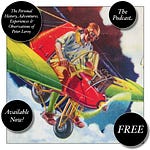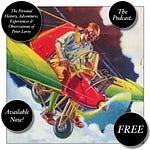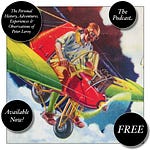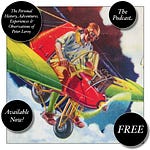“LET’S MAKE A PARTY of it,” I said. “We can all get together to watch the show when they’re on—us, and Gumma, and the Joneses, and—”
“No, I don’t think so, Peter,” said my father.
“Aw, come on,” I said. “It can be a real victory celebration, with everybody together, and we could have some of Mrs. Jones’s gumbo and you could make some tuna casserole, Mom, and Gumma could make chicken fricassee—”
I was hopping around, full of Guppa and Mrs. Jones’s certain victory, anticipating the pleasure of the victory feast, suggesting dishes, but my parents were ignoring me. Finally, when I wouldn’t shut up about the fun we were all going to have, my father said, “Peter, that’s enough. We are not going to have any victory celebration.”
“Aw gee—”
“‘Aw, gee,’ nothing. For one thing, we don’t know that Herb and What’s-her-name—”
“Mrs. Jones.”
“Mrs. Jones. We don’t know that they’re going to win. And it isn’t wise to count your chickens before they’re hatched.”
“And for another thing?”
“What?”
“And for another thing. You said ‘for one thing.’ What’s the other thing?”
“Never mind. Finish your lima beans.”
Later, when I was upstairs in my room, lying in the dark, sulking, I heard my parents talking in the living room. Little by little my father’s voice grew louder, until I could make out what he was saying; it was, “I have nothing against them, I just don’t want one in my house.”
I knew what he meant. I got out of bed. I wasn’t aware that I had a plan, but I think I felt that I had to see him, to judge the expression on his face, before I could be sure that what I thought of him was justified. I went partway down the stairs and sat down at the point where the wall ended. From this spot I could peek through the balusters and see my parents, sitting at the far end of the living room. There was my father, slumped in his overstuffed chair, a small man, diminished by his attitudes, hurt, frightened, angry. I shifted slightly, and the stair creaked. He looked up. I don’t know whether he could see me or not through the balusters, but for a moment it seemed that our eyes locked. I felt a thrill similar to that I had felt in the locker, hiding from the watchman, the thrill of danger, the danger of being found out, for here it seemed to me that if my father saw me, he would also see into me, he would know what I thought of him, what I was thinking of him. He could still save things between us. It wasn’t too late. He could change his mind now. He could declare that he was wrong. He kept his eyes on me for what seemed like a long while, and I froze there, in an awkward position, with the toes of one foot bent back, all my weight on that foot, not breathing.
Then he turned his eyes back toward the television set, his face sour and grim, and he said nothing. I waited, and I waited some more, hoping that he would speak, but he didn’t, and after a while I began to get a cramp from holding the same position for so long, and then I began to see that he never would say that he was wrong, because he thought he was right. In fact, he wasn’t thinking at all, merely feeling. Everything between us was ruined. From then on I would think less and less of him, grow more and more convinced that he was a fool. Our future was doomed.
Slowly I began to rise from my cramped position. I was going to creep back to bed, leave my father sitting there in silence, tiny in his comfortable chair, his range circumscribed by the limits of his own mind, his thinking hobbled by his fears, his views nothing but a hodgepodge of suppositions and superstitions, but then, before I’d even stood fully, something happened.
Who can say exactly what it was? Perhaps a cosmic ray, zipping along through space, passed at that moment through the atmosphere, through the roof of our house, through my bedroom upstairs, through the floor and ceiling, through my father’s skull, and into his brain, where it knocked out of its orbit a single electron in a single atom of his hippocampus, the seat of memory, conviction, and superstition, causing a tiny imbalance of electrical potential between two neurons, just enough to make those neurons fire across their synapse, exciting other neurons, which fired, exciting others, which fired, and so on, until neurons were firing all over the place, like mousetraps on a Ping-Pong table, and all my father’s wrongheaded ideas were flushed from his hippocampus and dissipated into nowhere, into the Zwischenraum, transforming him in an eyeblink from an unthinking bigot to a true homo sapiens, something like the sudden conversion Mr. Lodkochnikov experienced when he finally decided to buy a television set—or maybe the stair creaked as I stood up. Whatever it was, something happened to him. He seemed to snap. He sat up. He shuddered. He wore a look of surprise. He peered the length of the room, narrowed his eyes, frowned. He swallowed, and frowned again. Maybe it was heartburn. He turned to the television set again, but in a moment he looked toward my mother, and then he got up out of his chair and turned the set off. He spoke, apparently to my mother, as if there had been no pause, as if he’d been speaking to her all along.
“At least that’s the way I used to feel,” he said. “But, you know, Ella, maybe I’ve been wrong.”
“Huh,” said my mother, who must have wondered what he was talking about. I knew.
“I was looking at myself in the mirror down at the end of the room, and I don’t like what I see.”
My mother looked that way.
“I look small, so small, a poor man sitting in a big chair in the light of that stupid television set. He seems too small, this poor man. Small. And frightened. A prisoner of his own fears.”
My mother was starting to look a little frightened herself.
“He’s one of those people who’s ruled by emotion rather than thought, you know what I mean?”
My mother shook her head. Her mouth was open.
“He lets himself believe things that he doesn’t really know. That’s me, maybe. Maybe. Maybe I’ve let myself become a slave to irrational beliefs.”
“Bert,” said my mother.
“No, Ella,” said my father. “Let me go on. I think I let myself get sucked into a kind of ignorant tribalism. It’s like—it’s like—it’s like cumulative error. Do you know what that is?”
“No,” said my mother.
I had heard all I needed to hear. I crept back upstairs and got into bed. Below, I could hear my father explaining cumulative error to my mother. I fell asleep, content, secure in the knowledge that whatever had changed my father had changed our future. I wasn’t going to have to hold that earlier moment against him for the rest of our lives. I wasn’t going to have to hate him.
[to be continued]
Have you missed an episode or two or several?
You can begin reading at the beginning or you can catch up by visiting the archive or consulting the index to the Topical Guide. The Substack serialization of Little Follies begins here; Herb ’n’ Lorna begins here; Reservations Recommended begins here; Where Do You Stop? begins here.
You can listen to the episodes on the Personal History podcast. Begin at the beginning or scroll through the episodes to find what you’ve missed. The Substack podcast reading of Little Follies begins here; Herb ’n’ Lorna begins here; Reservations Recommended begins here; Where Do You Stop? begins here.
You can listen to “My Mother Takes a Tumble” and “Do Clams Bite?” complete and uninterrupted as audiobooks through YouTube.
You can ensure that you never miss a future issue by getting a free subscription. (You can help support the work by choosing a paid subscription instead.)
At Apple Books you can download free eBooks of Little Follies, Herb ’n’ Lorna, and Reservations Recommended.
You’ll find overviews of the entire work in An Introduction to The Personal History, Adventures, Experiences & Observations of Peter Leroy (a pdf document), The Origin Story (here on substack), Between the Lines (a video, here on Substack), and at Encyclopedia.com.












